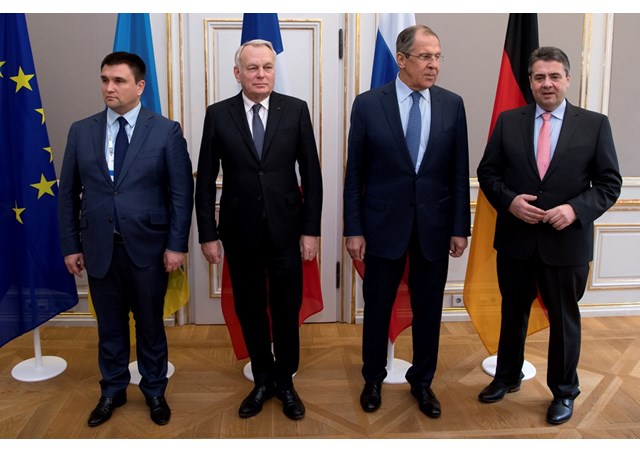
Ukraine's new ceasefire overshadowed by concerns

(Vatican Radio) A ceasefire was due to come into effect Monday in eastern Ukraine following a deal in Munich over the weekend to halt fighting between government forces and Russian-backed separatists and withdraw heavy weapons from the front line.
Listen to Stefan Bos' report:
The accord agreed by the German, French, Russian and Ukrainian foreign ministers followed an increase in fighting in recent weeks, though the prospects for peace in the region appear frail as pro-Russian-rebels and the Ukrainian army have clashed almost daily for the last 30 months.
Questions remained early Monday whether weapons would stay quiet across eastern Ukraine where the population suffered in a conflict that has killed nearly 10,000 people.
The foreign ministers of Germany, France, Russia and Ukraine agreed over the weekend to use their influence to implement a ceasefire between government forces and Russian backed separatists in eastern Ukraine. "In a small positive way, the contact group has once again agreed to start a ceasefire and the withdrawal of heavy weapons to those places where they should be on February 20," explained Russian Foreign Minister Sergei Lavrov to reporters.
"We have actively supported this decision and expressed the belief that this time we cannot allow for failure. Let’s see how the parties react to it," he added.
Dozens of people have been killed in recent weeks as fighting escalated between Ukrainian forces and pro-Russian-backed separatists especially in and around the government-held town of Avdiivka.
CEASEFIRE VIOLATIONS
German Foreign Minister Sigmar Gabriel acknowledged that previous ceasefire agreements have been violated but expressed hope that international observers of Europe's security organization OCSE will closely monitor the movements of heavy weapons. "All parties will use their influence to implement the agreement of the trilateral contact group from Feb 15,” he said, to a body comprising Ukraine, Russia and the Organization for Security and Cooperation in Europe (OSCE).
He said the aim is "to have a ceasefire starting from February 20 and to do what has long been agreed but never implemented: To withdraw the heavy weapons from the region, to secure them and enable the OSCE monitors to control where they are kept.”
However the United States says it is disturbed by Russia's decision to recognize passports and other documents issued by Russian-backed rebel authorities in eastern Ukraine. The OSCE has expressed concern that this decision will undermine peace and hurt the chances for the cease-fire to take hold.
Moscow says it made the move" on humanitarian grounds" as people in eastern Ukraine face "blockades" and in many cases cannot receive social benefits such as pensions or have no "adequate access" to hospitals and medicines amid ongoing clashes.
| All the contents on this site are copyrighted ©. |


